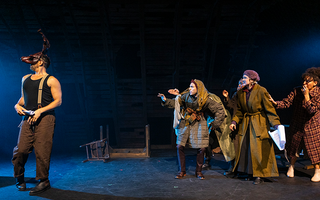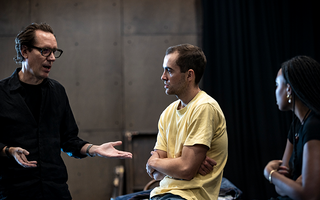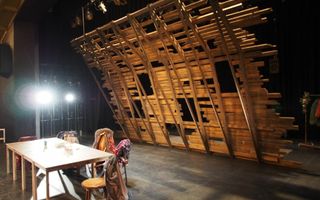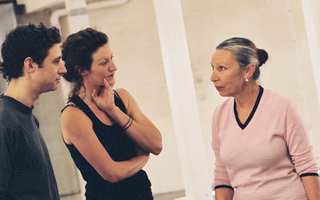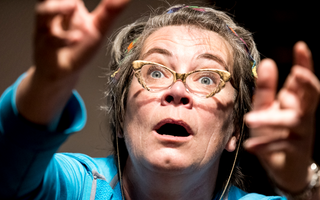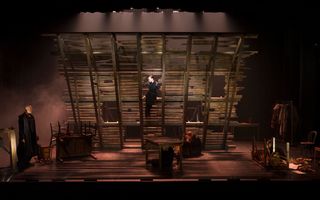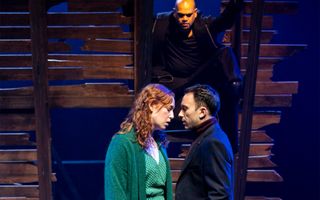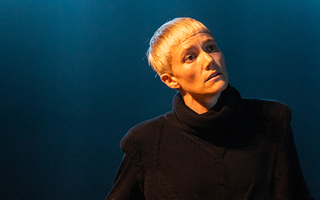 On Stage
On Stage
The Moon
The moon is a frequently recurring image throughout the play with both positive and negative associations, signifying many things. The action of the play of course takes place at night, and Shakespeare makes great mention of this throughout:
Ill met by moonlight, proud Titania.
Oberon, Act 2, Scene 1
The moon symbolises women, the divine feminine, emotion and transformation in its waxing and waning. It is also representative of the night, a time of dreams, nightmares, and love exchanged under the cover of darkness. The moon also has associations with madness or ‘lunacy’.
In the first scene of the play Duke Theseus is impatient with the moon, willing the time between now and he and Hippolyta’s “nuptial hour” to pass –
…but O, methinks how slow
This old moon wanes! She lingers my desires,
Like to a step-dame, or a dowager
Long withering out a young man’s revenue.
Theseus, Act 1, Scene 1
Hippolyta assures him that -
Four days will quickly steep themselves in night;
Four nights will quickly dream away the time;
And then the moon, like to a silver bow
New bent in heaven, shall behold the night
Of our solemnities.
Hippolyta, Act 1, Scene 1
In the next moment Egeus brings his complaint against his child to the Duke. Theseus tells Hermia that if she refuses to marry the man of her father’s choosing then she must pray to the Roman goddess of the moon, Diana, for mercy – “Or on Diana’s altar to protest / For aye austerity and single life.” (Act 1, Scene 1)
But the goddess of the moon is not a purely benevolent force. She responds to emotional imbalance and can become tempestuous when lovers quarrel, as with Oberon and Titania:
Therefore the moon, the governess of floods,
Pale in her anger, washes all the air,
That rheumatic diseases do abound;
And thorough this distemperature we see
The seasons alter…
Titania, Act 2, Scene 1
The movement of the moon has a direct impact on the natural world. Shakespeare suggests the feud between Titania and Oberon has caused the personified moon great upset and she has responded by inverting the natural order.
Eyes
Love looks not with the eyes, but with the mind;
And therefore is wing'd Cupid painted blind..
Helena, Act 1, Scene 1
Shakespeare uses eyes as a constant motif throughout the play. He explores the many ways that we see the world, and how our eyes can trick us – exploring the boundaries between appearance and reality.
Early in the play Hermia wishes her father “look'd but with my eyes" (Act 1, Scene 1), equating personal views and perceptions with the eyes. If only Egeus had his daughter's eyes, he could see her reasons.
The eyes are also referred to as a wellspring for emotion. Hermia, dismayed that she may not marry Lysander speaks of "the tempest of my eyes.” (Act 1, Scene 1)
Helena, later, when faced with her own love predicament, says of Hermia:
How came her eyes so bright? Not with salt tears:
If so, my eyes are oftener wash'd than hers.
Helena, Act 2, Scene 2
In this statement, we can also see how Shakespeare explores eyes as a symbol of beauty.
Bottom also understands the eyes of the audience as wellsprings of emotions, which he intends to affect:
That will ask some tears in the true performing of
it: if I do it, let the audience look to their
eyes; I will move storms...
Bottom, Act 1, Scene 2
Importantly, the magic flower juice is administered by placing it in someone’s eyes, and so the eyes become the vehicle for love and the subsequent confusion.
When Titania first sees Bottom, her eyes instantly attract her to him:
So is mine eye enthralled to thy shape;
And thy fair virtue's force perforce doth move me
On the first view to say, to swear, I love thee.
Titania, Act 3, Scene 1
It is love at first sight for Titania, though not in the usual sense. Demetrius and Lysander both have the love juice placed on their eyes, becoming a source of deception. Shakespeare explores that seeing is not necessarily always believing.
In the play-within-a-play, Pyramus cannot believe his eyes when he sees Thisbe dead, and asks his eyes for confirmation of the sad truth:
Eyes, do you see?
How can it be?
Bottom, Act 5, Scene 1
When the enchantment is reversed and the lovers awake, Hermia remarks:
Methinks I see these things with parted eye,
When everything seems double.
Hermia, Act 4, Scene 1
Serpents
Snakes and serpents are a recurrent image throughout the play. Historically, the serpent is seen as a symbol of deceit, stemming from the role of the snake in Book of Genesis, Old Testament. In Act 2, Hermia awakes from a nightmare, terrified and calling out for Lysander:
Help me, Lysander, help me. Do thy best
To pluck this crawling serpent from my breast.
Ay me, for pity! What a dream was here!
Lysander, look how I do quake with fear!
Methought a serpent ate my heart away,
And you sat smiling at his cruel prey.
Hermia, Act 2, Scene 2
Hermia quickly realises that Lysander has disappeared though doesn’t yet know that he’s been bewitched into romantically pursuing her best friend in her stead. The serpent in her dream could symbolise Lysander’s betrayal in choosing, though compelled by magic, to follow Helena. Thus, Hermia’s heart, the symbol of love, is being eaten away by the betrayal.
Searching for her lover, Hermia happens upon Demetrius and accuses him of killing Lysander. She refers to Demetrius as a serpent, perhaps believing her dream of the serpent to be a portent.
Later, in the confrontation scene between the four lovers, Lysander verbally attacks his former lover:
Hang off, thou cat, thou burr! Vile thing let loose,
Or I will shake thee from me like a serpent.
Lysander, Act 3, Scene 2
In Puck's epilogue, he states:
Now to 'scape the serpent's tongue,
We will make amends ere long...
Puck, Act 5, Scene 1
The serpent's tongue indicating hissing or booing from the audience – to avoid causing their audience any dissatisfaction, they will make amends.
